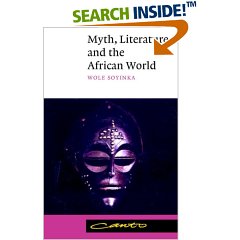Humanities Links
African Poetry
 One of the ‘subtle’ problems with the kinté space is its lack of wired connections with continental Africans—especially African poets. Now don’t get me wrong, we do feature “proper” Africans here at kintespace.com but all of them currently reside in the United States (like Deen Ipaye)—I’m talking about people living on the continent in continual contact.
One of the ‘subtle’ problems with the kinté space is its lack of wired connections with continental Africans—especially African poets. Now don’t get me wrong, we do feature “proper” Africans here at kintespace.com but all of them currently reside in the United States (like Deen Ipaye)—I’m talking about people living on the continent in continual contact.
When Uche Ogbuji of Copia and of O’Reilly fame published some del.icio.us links to African Poetry, I was reminded of this problem again. My guess: most young, serious African “artists” with an Internet presence are busy insinuating themselves into ‘other’ spaces—not like the kinté space. The financial pressures on these people push them away from what does not appear to be “an opportunity.” More guessing: the rest of the serious poets on the continent do not have the resources to “casually” get in contact with us. Maybe these people are preoccupied with other problems? Hmm…
So what’s cool about Uche’s efforts is that he hooked me up with a wonderful program about Wole Soyinka, “Conversations with History.”
“A Group Is Its Own Worst Enemy”
 …and for African peoples born after the birth of Columbus this is so, so, so applicable. What’s great about Clay Shirky’s “A Group Is Its Own Worst Enemy” is that he is not talking about peculiar defects lodged into the DNA of people with strong African features. His findings that inspire such a provocative title are based on the work of W.R. Bion—from 1948. We can safely assume that he was not studying the Black Panthers.
…and for African peoples born after the birth of Columbus this is so, so, so applicable. What’s great about Clay Shirky’s “A Group Is Its Own Worst Enemy” is that he is not talking about peculiar defects lodged into the DNA of people with strong African features. His findings that inspire such a provocative title are based on the work of W.R. Bion—from 1948. We can safely assume that he was not studying the Black Panthers.
In African or “Black” groups there is a tendency to complain about the impotence of the organization in the context that “we Black folk” are the only people on Earth with such impotence problems. When I was an uninformed, young, white liberal, I was very patient with this whining. Now I have this “crazy” idea that my ancestors built the pyramids—this idea appears in a similar manner that most science students today sense some kind of ancestral link to specific Greeks, like Archimedes, and specific Englishmen, like Sir Isaac Newton. I feel fortunate that I do not have to be so specific. When I know that ‘my people’ built the pyramids, it is very difficult to tolerate the impotence of contemporary African organizations.
For those Africans who are more in “in touch with reality,” I urge you to get off your Royal Dutch Duff and perform a historical survey of the number of “tribal” dances per language group. You should find that there are at least hundreds of language groups in Africa and each of them have at least dozens of dances that they traditionally perform. This means these people provided themselves—without the benefit of western supermarkets and Jane Fonda videos—enough foodstuffs to burn excess calories in stylized aerobic routines (many of which just happen to “accidentally” develop all major muscle groups). Once we are free from the ‘benefits’ of being a captive in an empire we will see and know just how much organization and potency it takes to achieve such a “simple” state of consciousness.
In the mean time as we “keep it real,” what keeps “real” groups together, according to Bion, is sex talk, the identification and vilification of external enemies and religious veneration. Having only a fraction of a complete idea of what Pre-Colonial Black Africa was like, I daresay that Bion’s three motives would roughly translate into:
- Valuing the need for and investing in a system that insures that next generation will thrive—to be fruitful and multiply.
- Valuing the fact that human beings are integrated with the natural environment and investing in systems that causes human beings to thrive as a part of the natural environment.
- Investing in a system that perpetuates the “family values” like the ones aforementioned. We can simplify or ‘break’ the definition of worship by replacing it with the word value. Systems that encourage such worship are mistaken as “religious” when seen in Western eyes. I would rather have them be mistaken for inter-generational data storage and transmission protocols but that’s perhaps Octavia Butler’s next novel.
It is so funny now how we say in unbroken English that we do not need to “reinvent the wheel.” We should be saying that we do not need to reinvent the group. Every person on Earth can trace their lineage back to a group that thrived before the arrival of Roman plumbing. What is interesting to me is how these groups—especially the most successful of these groups—thrived. (I keep using the word thrive to avoid the word survive.)
…those “stone temple pilots” of our past did not fly around in “the real world” they were navigators of community, arranging systems of energy.
